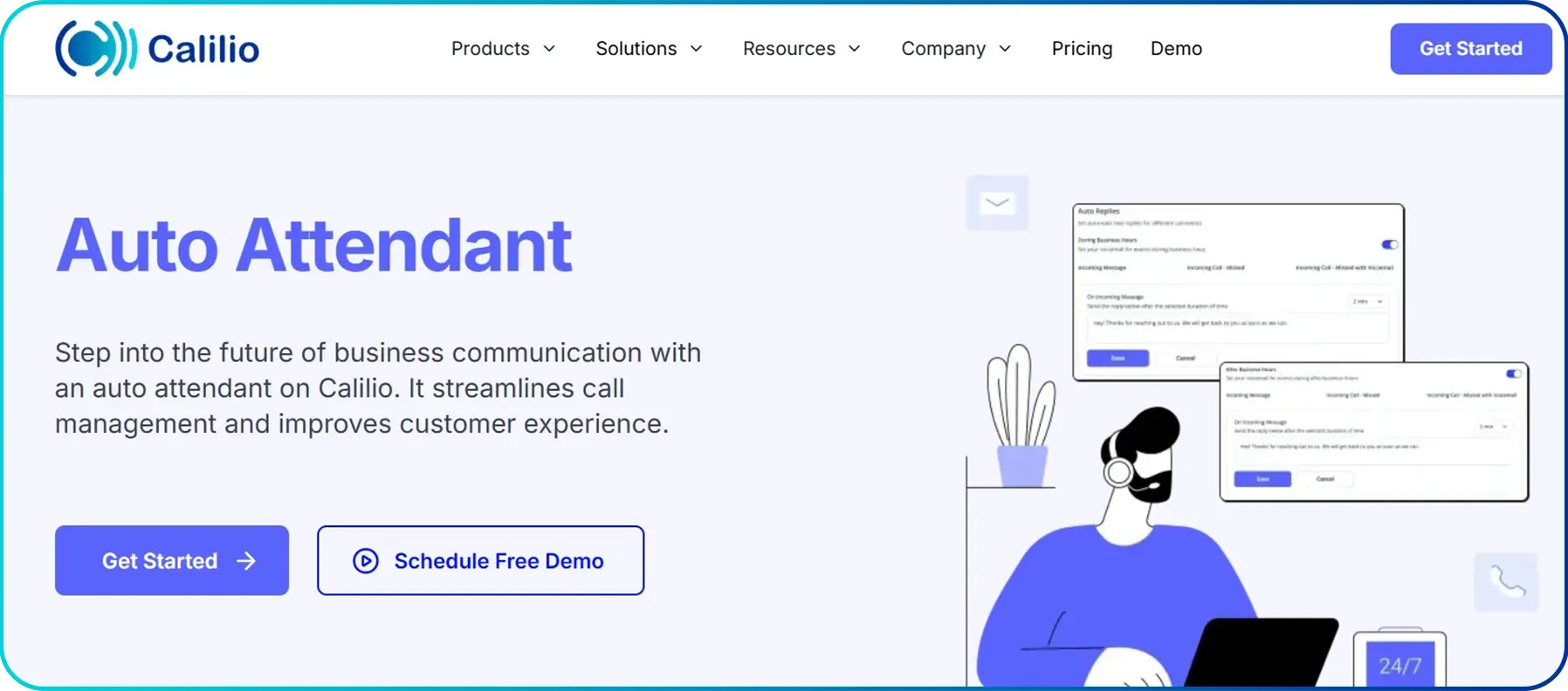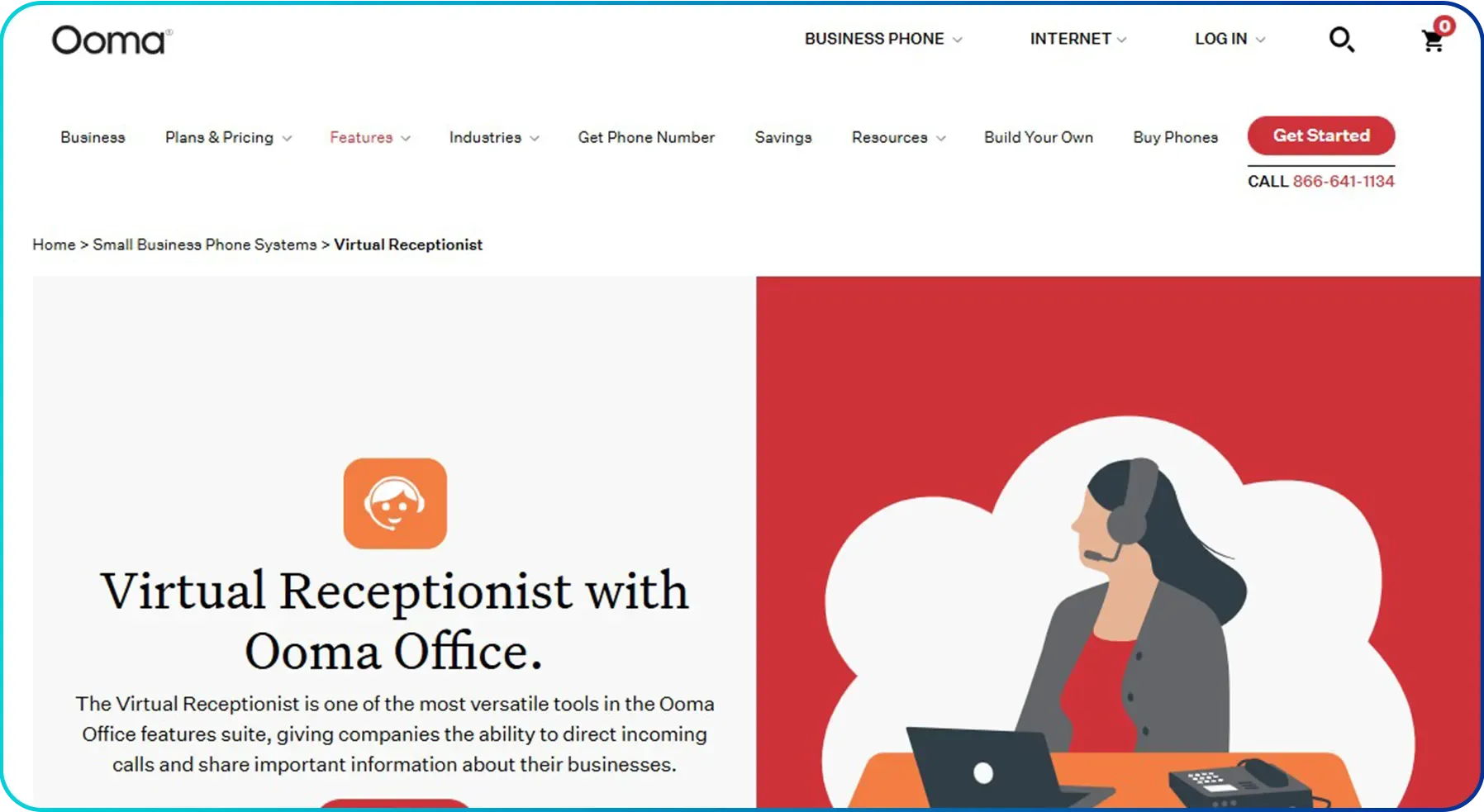Top 10 Automated Phone Systems for Small Business in 2025

Ever wished your business phone system could handle calls without human intervention? Things would be much more easier, right? Well, an automated phone system does just that.
As running a small business can have limited staff and resources, an automated phone system helps you to manage calls efficiently so you can focus on growing your business. It streamlines communication, improves customer service, and boosts productivity, all while keeping costs low.
In this guide, we’ll explore the best automated phone systems for small businesses in 2025, helping you find the perfect fit.
What Is an Automated Phone System?
An automated phone system is a telephony system that handles incoming and outgoing calls without human interference. It effectively manages calls using auto attendants, voicemail, call routing, and Interactive Voice Response (IVR). Installing an automated system smooths communication, lowers operating expenses, and improves customer service.
10 Best Automated Phone Systems for Small Business in 2025
1. Calilio
Calilio is the best small business phone system with automation features and an easy-to-use interface. It offers auto-attendant, voicemail-to-email, call routing, IVR, and CRM integrations to help startups manage calls efficiently.
It also offers sentiment analysis, which detects whether a caller is positive, negative, or neutral. With strong security and compliance features, it’s a good choice for businesses handling sensitive data. Plus, its affordable pricing makes it the best automated phone system for small businesses needing a complete phone system.
Pros | Cons |
|
|
Pricing Plans (Per user/month):
- Basic Plan: $12
- Business Plan: $28
- Enterprise Plan: Custom pricing
Note: The above-mentioned prices are based on annual billings.
Boost Your Small Business Efficiency with Calilio Today!
2. RingCentral
RingCentral offers a feature-rich automated phone answering system with features like tiered auto attendant and call routing. Moreover, its integration with Google Workspace and Microsoft 365 makes it easy for businesses to access its service directly from email and calendars, improving workflow.
Additionally, RingCentral's scalable capabilities help small businesses grow easily as demands change. It guarantees smooth operations, whether managing remote teams or responding to client inquiries.
Pros | Cons |
|
|
Pricing Plans (Per user/month):
- Core: $30
- Advanced: $35
- Ultra: $45
3. Dialpad
Dialpad is notable for its intelligent call routing, real-time call transcription, and AI-powered voice intelligence. Its integration with Slack and Salesforce is ideal for businesses prioritizing productivity, and its integrated analytics provide useful data on call trends.
Moreover, Dialpad’s features like IVR, call queuing, call routing, and AI greetings help automate call management for small businesses.
Pros | Cons |
|
|
Pricing Plans (Per user/month):
- Standard: $27
- Pro: $35
- Enterprise: Custom pricing
4. Nextiva
Nextiva integrates VoIP services with call automation, CRM software, and analytics to provide a comprehensive company phone solution. It also offers user-friendly call management and auto-attendant functions to enhance client interactions for small enterprises.
The system is a dependable option for long-term use because of its scalability, which enables companies to add new users and features easily as they expand.
Pros | Cons |
|
|
Pricing Plans (Per user/month):
- Digital: $25
- Core: $36
- Engage: $50
- Power Suite: $75
5. Vonage
Vonage is an automated phone answering system for small businesses with affordable initial cost and advanced AI attendant.
Moreover, Vonage’s VoIP system offers mobile app access, voicemail-to-email, call forwarding, and an IVR to improve collaboration and customer service. Another key perk is that it integrates with well-known business platforms like Salesforce to simplify managing client relationships.

Pros | Cons |
|
|
Pricing Plans (Per month/extension):
- Mobile: $19.99
- Premium: $29.99
- Advanced: $39.99
6. Grasshopper
Grasshopper offers a virtual phone system that includes voicemail transcription, call forwarding, and automated call handling. It is designed for solopreneurs and small teams that need a professional phone presence without the complexity of traditional systems.
You can handle calls from any location with the help of desktop and mobile apps.

Pros | Cons |
|
|
Pricing Plans (Per month):
- True Solo: $18
- Solo Plus: $32
- Small Business: $70
7. Ooma
Ooma is an easy-to-use and reasonably priced automated phone solution for growing businesses. Its features, such as voicemail management, phone blocking, and a virtual receptionist, help improve business communication.
Because of its easy setup and mobile-friendly platform, it is perfect for companies without a dedicated IT staff.

Pros | Cons |
|
|
Pricing Plans (Per user/month):
- Ooma Office: $19.95
- Ooma Office Pro: $24.95
- Ooma Office Pro Plus: $29.95
8. 8×8
8×8’s automated phone answering system for small businesses has advanced features like AI-powered call insights and advanced call management services like video conferencing, call queuing, and IVR. These features benefit growing businesses by streamlining communication both internally and externally.

Pros | Cons |
|
|
Pricing Plans (per user/month, billed annually):
- X2 Plan: $24
- X4 Plan: $44
- X6 Plan: $85
- X7 Plan: $110
- X8 Plan: $140
9. Aircall
Aircall is a cloud-based phone system built for small businesses, offering seamless CRM integrations with tools like Zendesk and Freshdesk to simplify customer interactions. It helps small teams manage calls efficiently with features like auto-attendant, call forwarding, call queuing, call recording, voicemail-to-email, IVR, and call routing.
With built-in collaboration tools, Aircall provides a centralized platform for handling customer service and sales calls.

Pros | Cons |
|
|
Pricing Plans (per user/month):
- Essentials: $40
- Professional: $70
- Custom: Contact sales
10. GoTo Connect
GoTo Connect is a versatile automated phone system designed for small businesses, especially those with remote members. It offers automated call distribution, voicemail management, video conferencing, and in-depth analytics, ensuring seamless communication.
Moreover, with its unified communications approach, micro-businesses can manage calls, meetings, and team messaging on a single platform, improving efficiency and customer service.

Pros | Cons |
|
|
Pricing Plans (per user/month):
- Basic: $27
- Standard: $32
What to Look for in an Automated Phone System?
When choosing an automated phone system, focus on services and features that improve call management, customer experience, business efficiency, and security.
- Features – Select the phone system with advanced telephony features like call routing, IVR, voicemail-to-email, call recording, and analytics for better call management.
- Affordability – Look for transparent pricing, flexible plans, and low upfront costs to fit small business budgets.
- Reliability – Ensure 99.9% uptime, strong network infrastructure, and minimal call disruptions for smooth operations.
- Scalability – Choose a system that lets you easily add users and integrate with CRMs as your business grows.
- Security – Opt for a system with robust encryption, access controls, and compliance with industry regulations to protect customer data.
Conclusion
An automated phone system helps small businesses manage calls efficiently, reducing the need for extra staff while ensuring smooth operations. Businesses can use automation for answering customer inquiries, routing calls, greeting customers, or queuing calls. However, be mindful of choosing the right provider that offers all the essential features.
Frequently Asked Questions
What is the best phone system for a small business?
A modern and automated phone system is the best kind of phone system for small businesses. Its advanced call management features help streamline communication while helping startups to grow more.
How much does an automated phone system cost?
Depending on the provider, prices usually range from $12 to $50 per user per month. The exact cost depends on your selected plan and available features.
What is the difference between an auto attendant and IVR?
While IVRs allow callers to interact with the system using voice commands or keypad selections for self-service options, auto attendants simply route calls through a basic menu without interactive responses.
Latest Posts
From the blog
The latest news, technologies, and resources from our team.





